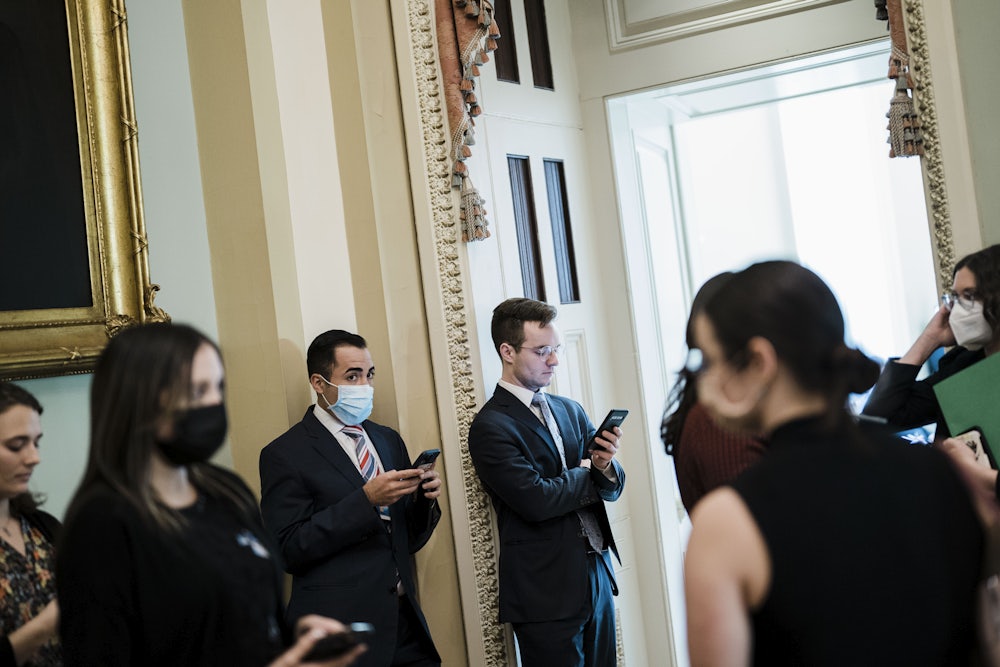A congressional staff uprising began late last year when social media accounts—notably one called Dear White Staffers, which quickly developed a huge following—allowed fellow staffers to shitpost details about the toxic environment for workers in Congress anonymously.
“I think the anonymity helps people trust the account more,” said DWS last week in an interview with The New Republic. “Also, I’m a congressional staffer. My followers know that much about me.”
DWS named names in Congress, revealing allegations that were shocking in their specificity, but anonymous, about members, including liberal Democrats, being verbally and emotionally abusive to their staffs. Now DWS is building a database with “a handful of volunteers” of stories crowdsourced from Hill staffers about members of Congress, in an effort to spur the unionization movement and make labor history by organizing the Hill.
DWS is thrilled with the progress that’s been made. “Looking back, this year has been the perfect recipe: The Congressional Progressive Staff Association, Latino Rebels, Congressional Workers Union … all came together into this insane, freaklike sequence of events,” said the staffer, who will reveal only that he is a person of color administering the account that has grown to over 91,000 followers on Instagram.
DWS has also become a relied-upon source of accountability and punishment for the bosses in a dark culture of abuse, harassment, and low pay of workers in Congress. When asked if he considers himself a journalist, he said: “I guess like any member of the press, when you’re posting or writing or editing something, you do have to take a level of carefulness with what you’re sharing. There are definitely some things that’ve been submitted where I just didn’t engage with it at all because I felt like it just didn’t fit with the purpose of the account, or it was way too personal, or it seems something was off about it.”
The impact of the efforts by DWS and others is real. The House Rules Committee had approved the official formation of the Congressional Progressive Staff Association, or CPSA, in June 2021, as a network of progressive workers in Congress. Over 1,100 Hill staffers have since joined CPSA, according to Zoe Bluffstone, the association’s press steward. “CPSA has created a watering hole after Covid limited us from meeting; a safe space for people with shared ideals … namely, that a lot of the stuff that happens to us on the Hill is not OK,” said Bluffstone, who points to a staffer survey CPSA conducted in February showing that 91 percent of more than 500 respondents said they wanted more protections in the workplace.
“I think people hit a breaking point after Covid, after January 6. People were so beaten down and exhausted that we needed an outlet. We needed to offload all this anxiety and pressure. Years of trauma … years of these horrible stories of harassment.… It felt like this collective scream into the void,” DWS told The New Republic.
Latino Rebels, the daily news website I work for, covers these worker screams into the void. I was the reporter who asked House Speaker Nancy Pelosi about whether she supported Hill staffer unions. “Madame Speaker!” I shouted over my colleagues, loud enough to jolt Pelosi at the podium at her press conference on February 3. “An anonymous Instagram account called ‘Dear White Staffers’ is alleging there are staffers on food stamps—”
Pelosi shut down my question before I could finish, saying that she wasn’t there to discuss “extraneous” matters. A colleague from Fox News seated beside me at the press conference immediately tweeted that Pelosi had dodged my question.
To her credit, Pelosi came back to me after answering several questions from my colleagues. “Madame Speaker: Do you support Hill staffers looking to unionize in this building?” Pelosi smiled … then dodged the question, saying that she supported staffers at the Democratic Congressional Campaign Committee, an answer that didn’t address whether she supported her own Hill staffers’ right to unionize.
Business Insider’s Bryan Metzger followed up with Pelosi’s deputy chief of staff, Drew Hammill: “Why had Speaker Pelosi dodged the question?” Within hours, I got an email from Hammill confirming Pelosi’s support for staffer unions.
Democratic Representative Andy Levin of Michigan quickly drafted a House resolution that would protect House staffers looking to form unions in their offices. At a press conference, Levin read a statement by a new anonymous organization of Hill staffers, the Congressional Workers Union, or CWU, before announcing that 120 House Democrats had signed on to a resolution to protect House staffers’ rights to unionize.
“Congress has failed to extend the legal umbrella of collective bargaining rights to our own personal office and committee staff,” said Levin, noting that while his resolution covered only the House, some “Senate colleagues are moving a resolution for their chamber.”
Three months later, the House passed Levin’s resolution by a party-line vote. House staffers had won protections for organizing in their workplace. The Office of Congressional Workplace Rights, or OCWR, is set to begin accepting union applications from individual member offices and committees next Monday, July 18.
The New Republic has learned that at least two House offices intend to submit their applications to OCWR next week. A press conference is being organized by the CWU members who spoke with me on the condition of anonymity. “We’re obviously very eager for July 18, when our rights will be fully in place,” said a founding CWU member. “For now, we’re in this weird limbo where we don’t have the protections or procedures yet, in case someone gets fired for filing an unfair labor practice complaint or something like that.”
To join the CWU, a simple majority of workers in a given Hill office must vote to unionize. Each House office that joins CWU will serve as its own collective bargaining unit represented by members elected from their own ranks. How things will unfold on the Senate side still isn’t settled. “I don’t know what the process is,” said Ohio Democratic Senator Sherrod Brown on Monday. “It’s up to the Rules Committee, I assume.”
Brown is on board, as is Elizabeth Warren. “I support unionization for all workers and believe that the Capitol staff should be able to unionize any way they want,” said Warren. She waffled, though, when asked if she would encourage Senate staffers to unionize despite the fact that they don’t have the same protections as House staffers. “I don’t want to give you an answer on this because I want to make sure I give a right answer,” said Warren. “I don’t want to mislead anybody and then somebody ends up at some risk.” Notably, Senator Bernie Sanders declined to answer the same question.
CWU’s organizers say there is nothing stopping Senate staffers from unionizing, but their organizing focus has mostly been in the House, where, in May, Pelosi raised the minimum salary for House staffers to $45,000 per year. Representative Alexandria Ocasio-Cortez—who has a pay floor of more than $50,000 for staffers in her office—had been quietly leading the policy fight since her freshman term, when she paid interns $15 per hour—kingly wages in a Capitol culture of unpaid internships.
On Tuesday, I asked Ocasio-Cortez why staffer pay was so important to her when she arrived in Congress in 2018. “Because I was poor,” she laughed. “The moment I got here, I saw how privileged this place was, from the very top to interns; and the reason for that is the only type of people that can afford to send their child on an unpaid internship are people who are wealthy enough to pay an extra rent to let their kid live in Washington. From the interns to legislative assistants to chiefs of staff … a pay floor allows a diversity of class, diversity of geography, diversity of race and culture to be able to be represented on the Hill, and it allows interns to be able to have the financial possibility of having this experience.”
CWU organizers told me that wage increases in the House will help lift working-class staffers—especially staffers of color—out of poverty; which will, in turn, help offices retain talent. “Congress has long used the fact that it is unpopular to pay themselves more as an excuse for not paying their staffers more,” said a CWU member on the condition of anonymity. “That has changed with the Ocasio-Cortez pay floor.”
Congress doesn’t usually move fast on much of anything, but a lot has happened very quickly in this year of worker uprising in the Capitol. The real organizing work for CPSA, CWU, and DWS begins Monday when OCWR starts accepting applications for new House staffer unions. Meanwhile, DWS and CPSA are collaborating on a Friday happy hour to connect progressive staffers.
“The bottom line is that fascism is rising, and all of the congressional workers—from the staffers to the cafeteria workers—are saying, ‘We don’t feel safe, and we’re not going to fucking stand for this,’” said a CWU organizer. “We need a voice at work so we can actually feel we’re going to go home at the end of the day to our families.”
For staffers like these, DWS said he is there to help. “I want to use my platform to build worker solidarity,” he said. “I guess I would consider myself an editorial voice on the Hill. Stories come in all the time. It’s a volunteer effort. I still don’t get paid for any of this. It’s a labor of love.”






